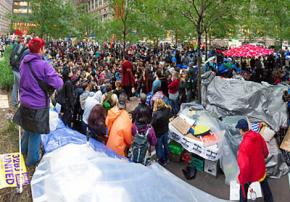Mobilization saves Occupy Wall Street
, and report on the victory for the Occupy Movement that saved the protest encampment in New York City.
THE CALL went out yesterday, and from well before dawn on the morning of October 14, people in their thousands gathered at Zuccotti Park in lower Manhattan to defend the Occupy Wall Street encampment from a threatened eviction by New York City officials.
Then the news came in the early morning hours, and cheers of relief but also something more swept through crowd that had now swelled to some 3,000: Mayor Michael Bloomberg and real estate firm Brookfield Properties were backing down from the threat to clear the square at 7 a.m. in order to "clean" the plaza.
For hours before, tension hung in the air, as police made preparations and protesters braced themselves for what most expected--based on the cops' treatment of protesters in prior weeks--would be a mass arrest carried out with the NYPD's typical brutality.
But the thousands of union members, students and everyday New Yorkers who responded to the call to come to Liberty Plaza--the protesters' new name for Zuccotti Park, a square privately owned by real estate giant Brookfield Properties--clearly compelled Bloomberg to question the wisdom of carrying out an act of mass repression against a peaceful crowd as the whole world watched.

The day before, Bloomberg announced that the square had become a "public health" concern, and that police would move in at 7 a.m. on Friday morning so it could be cleaned. Officials claimed the protesters could return afterward, but the list of restrictions--against, for example, sleeping bags--made it clear what the city really wanted: to put an end to Occupy Wall Street.
Activists sprung into action. The occupiers organized a cleaning operation that had Zuccotti Park looking far better than it ever had before, say protesters. And Occupy Wall Street and its supporters called on everyone to defend Liberty Plaza, the symbolic center of a movement that has gained national attention and spread around the country.
Some 300,000 people signed petitions, and callers clogged the city's 311 information line to protest the mayor's announcement. Crucially, New York City unions mobilized their members to get down to Zuccotti Park. The first calls asked for people to come by 6 a.m., but as fears grew that police might move in earlier, the messages, official and not, among activists simply said to come down as soon as possible.
Michael Ratner and the Center for Constitutional Rights had sent a letter to Bloomberg and Brookfield to make "clear that closing down Occupy Wall Street violates the First Amendment and is flatly illegal," Ratner said.
The following morning, Ratner described the "roar of joy" that went up when it was announced that the "cleaning" operation had been called off. "The health emergency was a pretext to destroy something all Americans should be proudest of," he told a reporter. "You can eat off the ground in this park."
Apart from the illegality of it, it was just too massive...It would have been a bloodbath. The idea that they were going to come in here when there were thousands of people all over the place--union people everywhere--they could not have successfully closed this park down...It's too big now. This park is becoming a permanent feature of the next generation of protests.
Damon McGee, an organizer for the health care union 1199SEIU, was one of hundreds of union members who responded to the call to defend the encampment, and he was there when news of the victory came. "It's exhilarating," said McGee. "We're standing up to the wealth. The wealthy have control of our democracy."
BLOOMBERG'S HIGHLY public reversal is a big embarrassment for the authorities, which have alternated between acting tolerant of the protesters and their grievances, and looking for opportunities to attack the Occupy movement, with the NYPD leading the way.
Now the movement has a fresh boost of confidence--and on the eve of a global day of action Saturday, October 15, against the greed and corruption of the 1 percent. Estimates of how far and wide the movement has spread are hard to come by, but it's certain that more than 1,000 cities, towns and campuses in the U.S. have seen Occupy actions, or meetings to plan for them.
"This isn't just a short-term victory," said Senia, one of many Occupy Wall Street organizers on the scene early Friday. "It's a chance for us to turn the tables and show that really we should be cleaning up Wall Street."
Senia was spurred to join the Occupy movement in part because her parents were almost made homeless after Chase Bank tried to foreclose on their home. The stress of the experience, among other things, contributed to her father's recent stroke. "We're going to move from protest to resistance," said Senia. "On Saturday, there will be a series of actions around the city culminating at Times Square at 5 p.m."
The Friday victory has many people feeling a new sense of empowerment.
"After this morning, I'm very optimistic, very hopeful that this will become even more powerful," said Pastor Omar Wilks, who was prepared for arrest this morning even though he had been detained with 700 other people during an Occupy march across the Brooklyn Bridge on October 1. He continued:
So-called expert critics in the media have questioned whether the protesters have a message--we do! We are coming together to expose corporate greed in the Wall Street banks and bought-off politicians and officials, and stand up to foreclosures that are happening across America. This has the potential to be one of the most powerful movements in U.S. history. Because it didn't start off with a set agenda, it's bringing together people of many ideologies who want real change.


